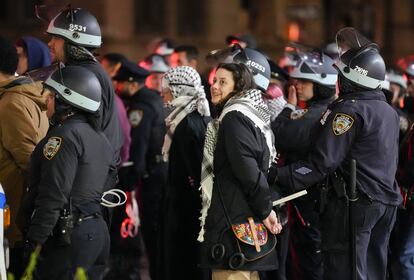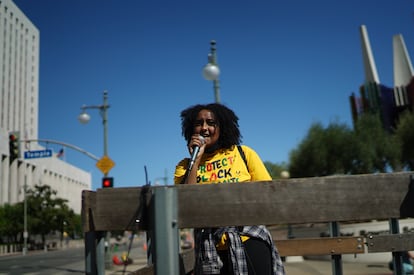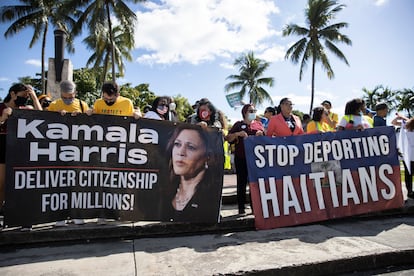Young voters on the left reject Kamala Harris: ‘She has made it clear that she doesn’t value my vote’
The Democratic candidate has a clear lead among those under 34, but her support for the Israeli offensive in Gaza and her administration’s handling of issues such as migration and the environment threaten to narrow it


“Kamala Harris has made it very clear that she doesn’t value my vote.” For Maryam Iqbal, the idea of voting for the Democratic candidate is inconceivable. This is the first presidential election in which the 19-year-old is eligible to participate, but she’s considering not doing so. Iqbal was one of the thousands of students arrested in the wave of pro-Palestinian protests that swept through the nation’s universities last spring. In her case, she was arrested twice, once in April when New York police stormed the student encampment erected in the heart of the Columbia University campus. That same night, she was suspended from the university and will not be able to return until January 2025.
This repression suffered by so many students at universities that until a few months ago were considered some of the most liberal institutions in the country may take its toll on the Democratic Party come November 5. Young people like Iqbal haven’t forgotten — nor forgiven — that Harris continues to defend the Israeli offensive in Gaza and that the United States has not stopped its arms shipments to Benjamin Netanyahu’s government. “We have no obligation to vote for her — in fact, we have an obligation to withhold our vote in order to not reward the Democratic Party for their funding of this genocide,” adds the Louisiana-born activist, whose family is originally from Kashmir.
It’s difficult to predict how many young people on the left like Iqbal will punish Harris by not voting for her or by backing a third party candidate; that will only be known for sure after the votes are counted. What is evident now, however, is that the latest polls point to the Democratic candidate having a clear advantage among 18- to 34-year-olds — a force of some 40 million voters in an extremely close presidential race — over her opponent, Donald Trump. The Pew Research Center, for example, places Harris ahead of the former Republican president by 57% to 34%, figures very similar to what The New York Times got from its polls: 58% to 37% for the Democrat. Along the same lines, the Harvard Kennedy School’s Institute of Politics, which has been polling young voters for two decades, gives 61% of the young vote to Harris and 30% to Trump.
That advantage is due in large part to the strategy the Harris campaign has deployed to reach out to young voters. In essence, her team has “memefied” the candidate: they’ve used social media, and TikTok, in particular, to make her look young, fun, relatable, approachable — everything Joe Biden is not. In just a few months, countless memes about Harris have gone viral, from coconut Kamala to Brat Summer. In addition, the vice president has garnered endorsements from pop icons like singer Taylor Swift and Beyoncé.

And, by and large, the tactic has worked: polls show that the Democrats have gained ground among young people since the vice president became the party’s candidate last July. However, those same polls also show that the Harris team is not successfully reaching all young people. Within this particular electorate, there are differences by subgroups. For example, Harris leads among young women, while men increasingly favor Trump. And while the vice president holds an advantage among young people of color, there is still room for improvement.
Within the latter group of voters, there are people like Iqbal who have already decided they will not vote for her, and others — including 16% of young Blacks, 13% of Hispanics and 14% of Asian Americans and Pacific Islanders, according to the Harvard poll — who remain undecided about whom they will vote for, or even if they will vote at all in next week’s election. In addition to Harris and Trump, there are three other presidential candidates they could choose to back: professor Colonel West, who is running as an independent; Jill Stein of the Green Party, who is running for the third time; and Chase Oliver of the Libertarian Party.
Above all of this hangs the big question of every four years: will young people really turn out and vote? Youth voter turnout has increased over the last decade, but it still remains low compared to other age groups. It’s a factor that this election cycle is compounded by the fact that young progressives have expressed opposition to the Democratic Party’s stance on Israel and Palestine, yes, but also on other issues, such as immigration, the environment and climate emergency, and the criminal justice system.
Those who will punish Harris by abstaining or voting for other candidates know they run the risk of Trump winning the presidency and implementing tougher positions on the issues they advocate for. But they see this election as an opportunity to take a stand against a two-party system they don’t believe in. “All of these politicians are part of the same system,” Iqbal notes. “There is something deeply wrong with a ‘democracy’ in which the only two options are genocidal war criminals who refuse to represent the interests of their own people.”

Harris’ track record comes under scrutiny
Maraky Alemseged is an organizer in Los Angeles for the Black Alliance for Just Immigration (BAJI). Born and raised in the California city, the 29-year-old is a registered Democrat but will not vote for Harris. Coming to that decision was a “natural, easy thing,” Alemseged says. “It wasn’t much of a process. It was an instinct.” Alemseged will cast their vote for a third party, but they’re not sure who yet.
When asked what factor most influenced their decision not to vote for Harris, they are blunt in their response. “No way I’m voting for a cop as an abolitionist,” they say, referring to the fact that the Democrat called herself California’s “top cop” during her time as a prosecutor and then as the state’s attorney general. Alemseged advocates for the abolition of prisons and the police, a movement that rose to the national discourse in 2020 during the protests against police brutality after the killing of George Floyd. And in Harris they see the personification of a prison system that has torn families apart for decades, especially in California, the state with the second-highest number of prisoners and the territory with the most people on death row.
Harris has often portrayed herself as a “progressive prosecutor,” but leftist activists like Alemseged criticize her for her record of wrongful convictions, her tendency to incarcerate Black men, and her opposition to investigating police-involved shootings. “I can’t vote for someone who put away a large amount of Black people in California and caused damage to our communities that will never be remedied, especially if she becomes president,” Alemseged says.
Alemseged also points to the immigration policies of the Biden-Harris administration as another issue that caused her to turn her back on the Democratic Party. They recall that, as vice president, Harris once urged immigrants not to come to the United States, and she has supported the border restrictions that Biden has implemented in recent months. “I cannot in good conscience vote for someone with those sorts of ethics,” they insist.
“And the nail on the already far underground coffin,” Alemseged adds, “is her unwavering support of genocidal entities,” including Israel in Palestine. “I can’t get behind someone who is a warmonger and is proud of it. She stands behind the fact that she wants to expand the U.S. war machine,” they point out. During her speech at the Democratic National Convention, Harris stated that as president she will “ensure that America has the strongest and most lethal fighting force in the world,” a promise she has repeated on multiple occasions.

Jordan Caroompas repeats almost all of Alemseged’s points, but highlights another important issue for young people like them who have decided not to vote for Harris: the environment. “I, for a really long time, just felt like I was an apolitical person, but what really drove me to get involved was the environment. Being from upstate New York, bordering Pennsylvania, fracking has always been something that I’ve been really concerned about,” they explain.
Caroompas, 32, recalls that in the 2020 election, Biden promised to end the practice on public lands and waters. Four years later, not only has he not banned it, but more drilling permits have been granted under his tenure than during the administration of his predecessor, Trump. Harris, for her part, was also in favor of vetoing fracking as a candidate in 2020, but now pledges to allow it continue if elected president.
“It’s interesting that Kamala has, since 2020, reversed basically everything she’s ever said about trying to ban fracking. That’s a bad sign for me, obviously,” Caroompas points out. “I find it tricky to accept that something that was considered a democratic value four years ago has been erased and forgotten,” they add.
As a result, they will not vote in November, for Harris or any other candidate. “There’s no real point in me taking the time to vote. I don’t trust these parties and Kamala is a figurehead for a larger problem,” they say.
Fed up with the two-party system
The “larger problem” they refer to has to do with the weariness that young voters feel with politics. A number of research studies suggest that they are disillusioned with the status quo. One, released this summer by the Berkeley Institute for Young Americans at the University of California, found that young voters — including Gen Z and millennials — believe the current political system is incapable of addressing the challenges facing their generations. Many, regardless of political affiliation, share a sense of fatalism. This leads to more young voters choosing to defect from the two major political parties, while others give up political engagement altogether, according to the Berkeley researchers.
From CIRCLE, a Tufts University research center focused on youth civic engagement, Alberto Medina explains that this reality is due to the fact that young voters are dissatisfied with the two-party system that dominates U.S. politics. “The data show that young people do not trust political parties and other institutions. They have a low level of trust in both the Democratic Party and the Republican Party and are less likely to join or identify with them,” he says.
“What they want is action, to resolve what they believe are problems in their communities. They see politics from that perspective, not from the perspective of, ‘I’m a Democrat’ or ‘I’m a Republican and I vote out of loyalty to my party,’” Medina adds.
Kaitlyn Wong identifies with that sense of pessimism. The 26-year-old, originally from California and now living in New York City, will not vote for Harris, but has not yet decided whether she will back a third-party candidate or simply sit out the election. “I’ve been going back and forth about not voting. I am sure that I’m not going to vote for Harris or Trump, but not voting feels a little wrong. I don’t know why yet, because I don’t believe in our system at all and it’s not something that I feel reflects any of my values and what our country deserves. But it’s something I’ve been struggling with,” she admits.
Friends have told her that voting for a third party would be tantamount to a vote for Trump, but she doesn’t see it that way. “Because I don’t support either side. To me, at this point, they kind of stand on the same plane, both parties. They’re both these two evil things that I don’t support, so why would I vote for either?” she adds.
“I’m so jaded about it that I feel what I believe we deserve is so far out of reach. I wish I had a more hopeful view, but the realest thing I can say is I feel really bleak,” Wong says. “I don’t believe that my vote matters because I believed that for eight years and nothing came out of it. Things have just gotten worse.”
Alemseged, the young activist from Los Angeles, believes that the United States has “moved past” the two-party system. “With millions of people who have so many ideas and opinions, to think we can be boiled down to two parties? It’s not a modern system, it doesn’t fit us. We’re long overdue for a new system and new institutions for this so-called democracy,” they say.
Caroompas agrees, and adds that a two-party system is undemocratic. “I don’t think that having a false choice is giving voters a voice,” they point out.
For Iqbal, the Columbia University student, this means having to vote for the least bad option every four years. “To constantly capitulate to this ‘lesser of two evils’ rhetoric is exactly how the standard for evil every election cycle continues to increase,” the pro-Palestinian activist assures.
Sign up for our weekly newsletter to get more English-language news coverage from EL PAÍS USA Edition
Tu suscripción se está usando en otro dispositivo
¿Quieres añadir otro usuario a tu suscripción?
Si continúas leyendo en este dispositivo, no se podrá leer en el otro.
FlechaTu suscripción se está usando en otro dispositivo y solo puedes acceder a EL PAÍS desde un dispositivo a la vez.
Si quieres compartir tu cuenta, cambia tu suscripción a la modalidad Premium, así podrás añadir otro usuario. Cada uno accederá con su propia cuenta de email, lo que os permitirá personalizar vuestra experiencia en EL PAÍS.
¿Tienes una suscripción de empresa? Accede aquí para contratar más cuentas.
En el caso de no saber quién está usando tu cuenta, te recomendamos cambiar tu contraseña aquí.
Si decides continuar compartiendo tu cuenta, este mensaje se mostrará en tu dispositivo y en el de la otra persona que está usando tu cuenta de forma indefinida, afectando a tu experiencia de lectura. Puedes consultar aquí los términos y condiciones de la suscripción digital.








































